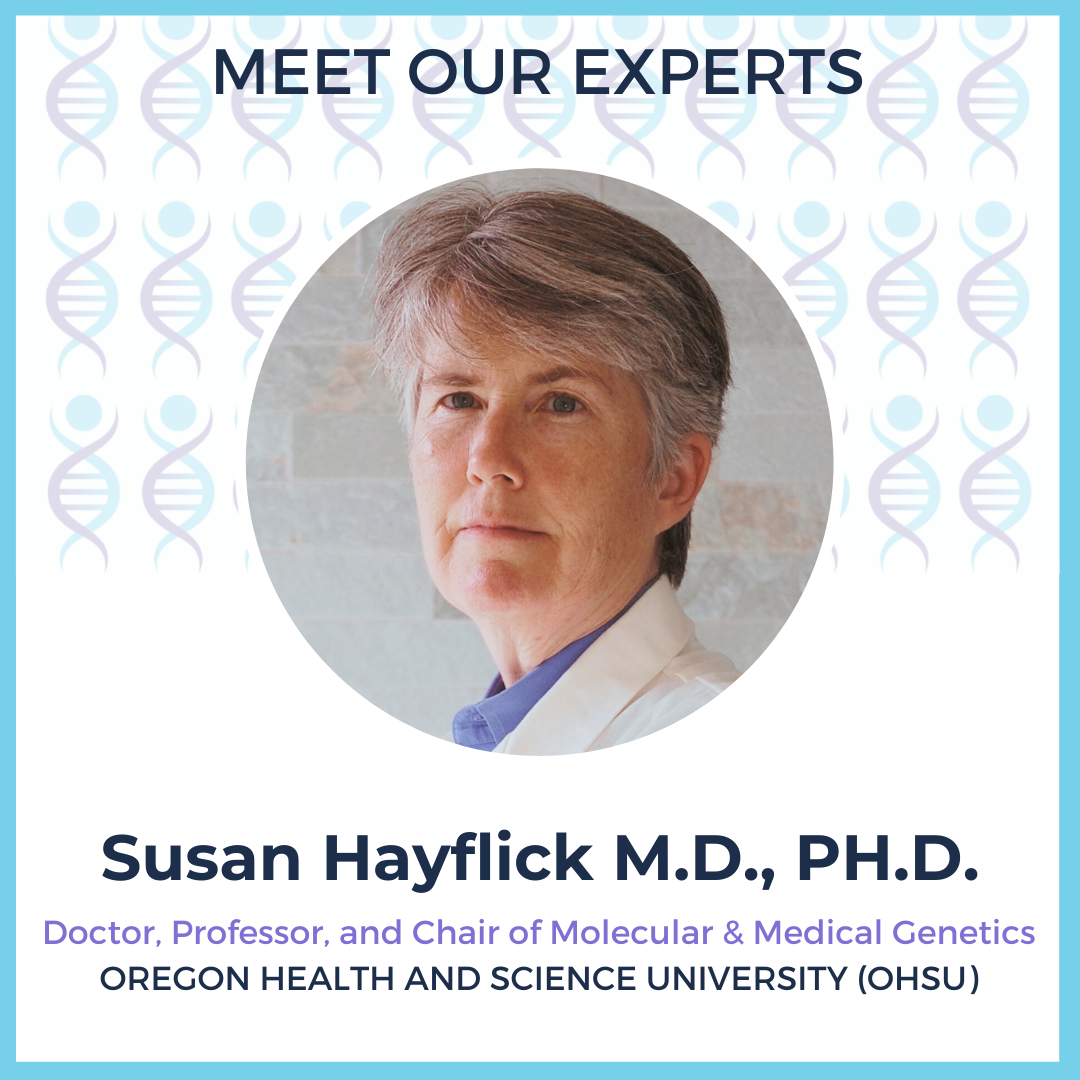The INADcure Foundation is in its 6th year of providing funding to OHSU/the Hayflick Lab. We have provided funding for their PLANready Natural History Study and the clinical care guidelines for INAD/PLA2G6-related disorders, both of which are currently in progress.

Susan Hayflick M.D., PH.D.
Doctor, Professor, and Chair of Molecular & Medical Genetics
Oregon Health & Science University (OHSU)
LET’S MEET: Dr. Hayflick
I am a practicing medical geneticist and scientist.
My career chose me; I met a family with PKAN early in my career and they hooked me.
That family.
From my recent graduation speech: My fellow graduates, Despite appearances we have a lot in common. Since I’m turning 65 in a few months I have to figure out Medicare, but I just got my PhD! What possessed me to do that at my age? Though I’ve been a scientist now for 30 years, I wasn’t always one. I grew up with a scientist father and spent my formative years working hard NOT to become him. I always wanted to be a doctor, a family doctor in rural Vermont to be specific. But as you might guess I strayed quite far from my plans. I did go to medical school but became a medical geneticist, which is a very cool medical specialty that focuses on the diagnosis and management of people with genetic disorders.
I started my first job as a medical geneticist and soon after I met a family in which three of their four daughters were affected by a rare neurodegenerative disorder. This family captivated me. They were Amish, dealing with profoundly disabled children without electricity, a telephone or health insurance. But they seemed to have made their peace with their lives, while relying on their families and community for support and finding joy each day with their children. We knew nothing about the origins of this disease when I met this family in 1991 before some of you, my fellow graduates, were born. Diagnosing these girls wasn’t enough for me; I wanted to figure out their disease. I wanted to find the gene, dissect the pathophysiology, and come up with a rationale treatment. I had the audacity to think I could do that as a newly minted medical geneticist.
An academic career is an extraordinary privilege in pursuit of knowledge. My own has been driven by a need to know the cause of this disease and a determination to change the outcome for people affected. To get where I wanted to go I needed scientific training, mentoring, grant money, dedicated collaborators, and belief in myself. It took us a decade to find that gene, another decade to finally dissect the disease process in our animal model, five more years to test a candidate treatment, and another six to complete a first-in-human trial that we will present to FDA later this year for approval. Though those three sisters died many years ago, in that clinical trial we enrolled six children from the Amish community, all distantly related to the girls who got me hooked on this project. My decision to become a scientist was driven by my determination to improve the lives of people with this devastating disease. I had to become a scientist to get where I wanted to go.
After 30 years of scientific discovery, I had a chance to earn my PhD with a collaborator in the Netherlands – the red and white in my hood recognizes that university. I defended last October and passed. The degree was a gift I gave myself to mark my accomplishments. For me it was in part a look back. For you all, it’s a look forward to whatever’s next.
My Gen Z nieces have warned me not to give advice – they’d rather that I just listen. And while I understand their perspective, I do have three points of advice. #1 – Celebrate yourself today. You have accomplished something important – celebrate you. #2 – Use your education to do good in the world. Change this world for the better. Do it through your work or through your relationships or through other means you choose but set your intention to doing good. And finally #3 – you are your greatest asset, so take the time and do the work to know yourself deeply. But for today, it’s enough to just celebrate. Thank you.
INAD is one of the NBIA disorders, all of which I work on and many of which my group discovered the causative gene for.
See above.
Changing the world.
Think about my work, spend time with family, cook
Research money so I can spend more time advancing therapeutics and less time finding the money to do so.
I know this much is true
To fly
